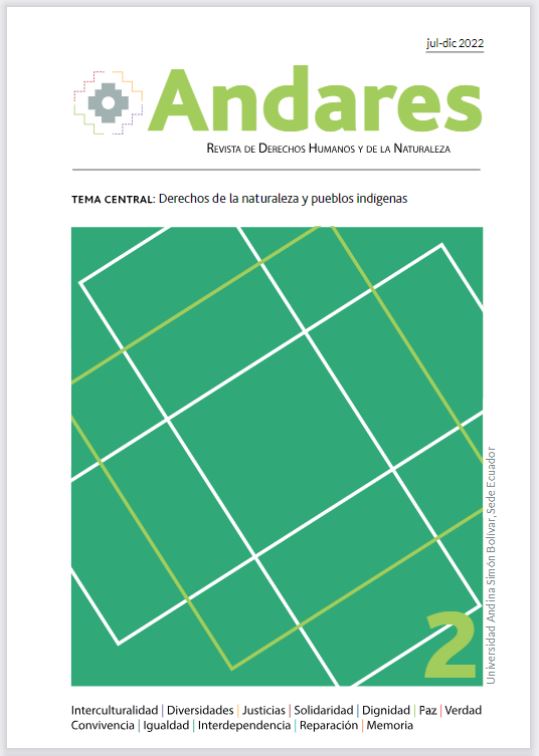The Dilemmas of Silence: Evidence, Indigenous Traditional Knowledge and Secrecy in Four Cases Involving Indigenous Peoples in Cultural and Territorial Isolation
DOI:
https://doi.org/10.32719/29536782.2022.2.3Keywords:
derechos humanos, derechos indígenas, conocimientos tradicionales, evidencia, mapa de evidencia, Pueblo of Jemez, Corte Interamericana de Derechos Humanos, Tagaeri y TaromenaneAbstract
Within many Indigenous cultures, traditional and spiritual knowledge is considered secret. It requires initiation and is safeguarded by different groups or levels of religious authority within a community. Transmission of such knowledge is usually performed at specific times, places and to selected peoples only. When Indigenous communities are claiming their rights to traditional land in western-oriented legal forums, they are required to provide proof of their connection to the lands and speak about the importance the sacred grounds hold in their tradition–and are required to do so according to Western legal discourse and protocol. When requirements for evidence neither represent nor respect Native culture, Indigenous parties to the claim often go silent, or else risk silencing the practices they originally aimed to protect. This article discusses the dilemma Indigenous communities face when asked to provide evidence despite cultural restrictions on traditional knowledge transfer. It first looks at evidence and secret knowledge in the case Pueblo of Jemez vs. United States of America (2019) adjudicated in federal US courts, and suggests a set of alternative evidentiary mappings that respect Jemez Pueblo rules of traditional knowledge sharing, produced by the author and Jemez tribal members. It then turns to acts of refusal to share detailed information on sacred sites and its consequences, litigated over in the US federal court cases Havasupai Tribe v. United States of America (1990) and Pueblo of Sandia vs. United States of America (1995). Finally, it discusses questions of evidence production in the case Pueblos Indígenas Tagaeri y Taromenane vs Ecuador, the first case on peoples in voluntary isolation to be adjudicated by the Inter-American Court of Human Rights.
Downloads
References
Brandt, Elizabeth A. “On Secrecy and the Control of Knowledge: Taos Pueblo”. In Secrecy: A Cross-Cultural Perspective, edited by Stanton K. Tefft, 123-46. New York: Human Sciences Press, 1980.
—. “The Role of Secrecy in a Pueblo Society”. In Flowers of the Wind: Papers on Ritual, Myth, and Symbolism in California and the Southwest, edited by Thomas C. Blackburn, 11-28. Socorro, US: Ballena Press, 1977.
Clews Parsons, Elsie. Isleta Paintings. Washington DC: Smithsonian Institution, 1962.
Colwell-Chanthaphonh, Chip. “Sketching Knowledge: Quandaries of Mimetic Reproduction of Pueblo Ritual”. American Ethnologist 38, n.° 3 (2011): 451-67.
Constable, Marianne. Just Silences: The Limits and Possibilities of Modern Law. Princeton, US: Princeton University Press, 2005.
Cordero, David, and Nicholas Koeppen. “Oil Extraction, Indigenous Peoples Living in Voluntary Isolation, and Genocide: The Case of the Tagaeri and Taromenane Peoples”. Harvard Human Rights Journal 34, n.° 1 (2021): 117-54.
Dozier, Edward P. “Rio Grande Pueblos”. In Perspectives in American Indian Culture Change, edited by Edward H. Spicer, 94-186. Chicago: University of Chicago Press, 1961.
Foucault, Michel. Power. New York: New Press, 2000.
Hershey, Robert A., Jennifer McCormack, and Gillian E. Newell. “Mapping Intergenerational Memories (Part 1): Proving the Contemporary Truth of the Indigenous Past”. Arizona Legal Studies Discussion Paper No. 14-01. January 2014.
IACHR. Report No. 96/14. Petition 422-06. Report on Admissibility. Tagaeri and Taromenani Indigenous Peoples in Isolation v. Ecuador. November 6th 2014. https://bit.ly/3tXamoW.
Kolowratnik, Nina Valerie. The Language of Secret Proof: Indigenous Truth and Representation. Berlin: Sternberg Press, 2019.
Lyotard, Jean-François. The Differend: Phrases in Dispute. Minneapolis: University of Minnesota Press, 2011.
Mackenzie, Catriona, Christopher McDowell, and Eileen Pittaway. “Beyond ‘Do No Harm’: The Challenge of Constructing Ethical Relationships in Refugee Research”. Journal of Refugee Studies 20/2 (2007): 299-319.
Mense, Audrey. “We Could Tell You, but Then I Would Have to Kill You: How Indigenous Cultural Secrecy Impedes the Protection of Natural Cultural Heritage in the United States”. Chicago-Kent Journal of International and Comparative Law 11, n.° 1 (2011): 1-24.
Narváez, Roberto. “Territorialidad de los grupos familiares de pueblos indígenas en aislamiento (PIA) en la región del Yasuní, Amazonía ecuatoriana”. Tipití. Journal of the Society for the Anthropology of Lowland South America 16, n.° 1 (2018): 103-19.
—. “Unreal Borders, Grandparents and Common Territories: The Yasuní Region Territory of Inter-Dependence and Interrelation of Waorani and Family Groups in Isolation”. Revista de Antropología 64 (2021).
Plaut, Ethan. “Tribal-Agency Confidentiality: A Catch-22 for Sacred Site Management?”. Ecology Law Quarterly 36, n.° 1 (2009): 137-66.
Sekaquaptewa, Emory, and Dorothy Washburn. “They Go along Singing: Reconstructing the Hopi Past from Ritual Metaphors in Song and Image”. American Antiquity 69, n.° 3 (2004): 457-86.
Spicer, Edward H. Cycles of Conquest: Impact of Spain, Mexico, and the United States on the Indians of the Southwest, 1533–1960. Tucson, US: University of Arizona Press, 1962.
Stohr, Glen. “The Repercussions of Orality in Federal Indian Law”. Arizona State Law Journal 31 (1999): 680-704.
Tuhiwai Smith, Linda. Decolonizing Methodologies: Research and Indigenous Peoples. London: ZED Books, 2012.
United States. Code of Federal Regulations. Last ammended: November 18th, 2022. https://bit.ly/3UhnQXn.
United States Court of Appeals Tenth Circuit. Pueblo of Jemez v. United States of America. June 26th 2015.
—. Pueblo of Sandia v. United States. March 14th 1995. United States District Court for the District of Arizona. Havasupai Tribe v. United States. April 18th 1990.






